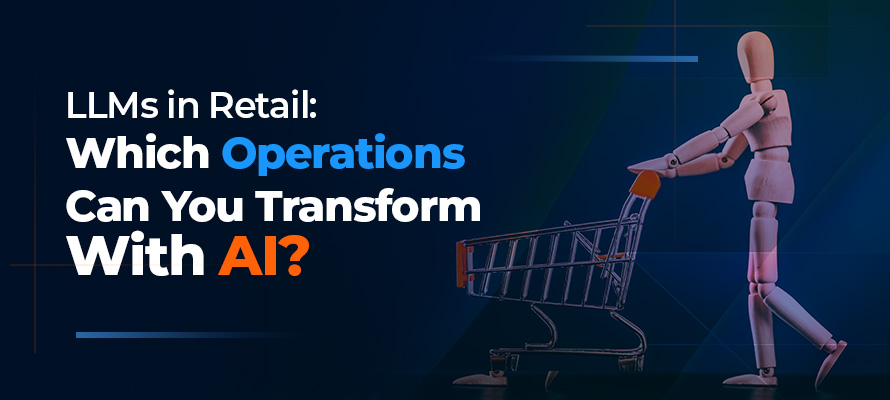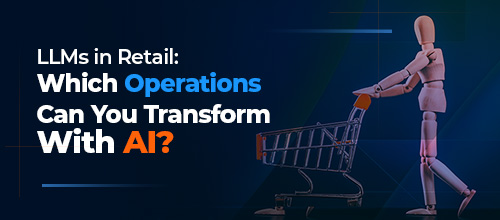LLMs in Retail: Which Operations Can You Transform With AI?

Written by Syed Usman Chishti
Technical Content Writer
August 9, 2023
Artificial Intelligence (AI) has been making significant waves across various industries, revolutionizing business operations. The retail sector has witnessed remarkable transformations by integrating AI-powered solutions. One of the most groundbreaking advancements in AI is the development of Large Language Models (LLMs), such as OpenAI’s GPT-3.5. These powerful models have the potential to reshape the retail landscape by providing intelligent solutions and enhancing customer experiences.
In this blog, we will explore how you can leverage Generative AI in retail to transform your operations.
Personalized Customer Experiences

Providing personalized customer experiences is crucial for building customer loyalty and driving sales in the retail industry. Large Language Models can significantly enhance personalization by analyzing customer data and generating tailored recommendations and interactions. Here are some ways LLMs can help you deliver personalized customer experiences:
Product Recommendations
Providing personalized customer experiences is crucial for building customer loyalty and driving sales in the retail industry. Large Language Models can significantly enhance personalization by analyzing customer data and generating tailored recommendations and interactions. Here are some ways LLMs can help you deliver personalized customer experiences:
Content Personalization
LLMs can analyze customer interactions, such as website visits, clicks, and engagement metrics, to personalize content delivery. By understanding customer preferences, LLMs can dynamically generate website content, email newsletters, and social media posts that are relevant and engaging for everyone. This level of personalization enhances customer engagement and increases the likelihood of conversion.
Voice Commerce
With the rise of smart speakers and voice assistants, LLMs can enable voice commerce by understanding natural voice commands and assisting customers in purchasing through voice interactions. This technology provides convenience and a personalized shopping experience for customers, increasing customer satisfaction and loyalty.
Virtual Styling and Fit Recommendations
LLMs can assist customers in finding the correct clothing sizes, styles, and combinations by analyzing their preferences, body measurements, and fashion trends. This virtual styling feature can help customers make confident purchase decisions, reducing the likelihood of returns and improving customer satisfaction.
Enhanced Customer Service

Enhanced customer service is a critical factor for success in the retail industry. Large Language Models can be instrumental in improving customer service by providing intelligent solutions and efficient support. Here are some ways LLMs can enhance customer service in the retail sector:
Chatbots and Virtual Assistants
Enhanced customer service is a critical factor for success in the retail industry. Large Language Models can be instrumental in improving customer service by providing intelligent solutions and efficient support. Here are some ways LLMs can enhance customer service in the retail sector:
Automated Customer Support
LLMs can analyze customer support tickets and queries to generate automated responses. By training LLMs on historical customer data and support interactions, they can provide pre-determined answers to frequently asked questions or joint issues. This automation reduces the workload on customer support teams, enables faster response times, and improves efficiency in handling customer inquiries.
Voice-Based Customer Support
LLMs can be integrated into voice-based customer support systems, allowing customers to interact with the system using voice commands. Voice recognition technology combined with LLMs can understand and process customer queries, provide personalized responses, and assist with various tasks such as order placement, returns, and troubleshooting. This voice-based support enhances convenience for customers and provides a seamless experience.
Sentiment Analysis and Customer Feedback
LLMs can analyze customer feedback and sentiment to gain valuable insights into customer satisfaction levels. By understanding customer sentiments, retailers can identify areas for improvement and take proactive measures to address customer concerns promptly. LLMs can also assist in sentiment analysis of social media conversations, reviews, and surveys, allowing retailers to gather feedback at scale and respond accordingly.
Inventory Management

Effective inventory management is crucial for retail businesses to optimize operations, minimize costs, and improve customer satisfaction. Large Language can play a significant role in enhancing inventory management processes. Here’s how LLMs can help improve inventory management in the retail sector:
Demand Forecasting
LLMs can analyze historical sales data, market trends, and other relevant factors to generate accurate demand forecasts. By understanding patterns and seasonality in customer buying behavior, LLMs can help retailers predict future product demand. This enables better inventory planning, ensuring the correct quantity of products is available at the right time, reducing stockouts, and minimizing excess inventory.
Inventory Optimization
LLMs can analyze various data sources, such as sales history, customer preferences, market trends, and supplier information, to optimize inventory levels. By considering various factors, LLMs can determine optimal reorder points, safety stock levels, and replenishment strategies. This helps retailers maintain an optimal balance between inventory holding costs and the risk of stockouts.
Supplier Management
LLMs can assist in supplier management by analyzing supplier performance, lead times, and pricing data. By considering various factors, LLMs can help retailers identify reliable suppliers, negotiate favorable terms, and optimize the supplier selection process. This ensures timely and cost-effective inventory replenishment, improving overall supply chain efficiency.
Product Lifecycle Management
LLMs can analyze product performance data, customer feedback, and market trends to manage the product lifecycle. By understanding the demand and popularity of different products, LLMs can help retailers make informed decisions regarding product assortment, stock clearance, and new product introductions. This helps optimize inventory turnover, reduce obsolescence, and maximize profitability.
Price Optimization

Pricing optimization is a crucial aspect of retail operations, directly impacting sales, profitability, and competitiveness. Significant Language can contribute to pricing optimization strategies in the retail sector. Here’s how LLMs can help retailers enhance their pricing strategies:
Dynamic Pricing
LLMs can assist in implementing dynamic pricing strategies by considering various factors such as demand, seasonality, competitor prices, and customer preferences. By analyzing real-time data, LLMs can suggest optimal pricing adjustments to maximize revenue and profitability. This enables retailers to respond quickly to market changes and adjust prices dynamically based on supply and demand dynamics.
Competitive Analysis
LLMs can analyze vast amounts of data, including competitor pricing information, market trends, and customer behavior, to provide valuable insights for competitive analysis. By understanding competitors’ pricing strategies, LLMs can help retailers identify opportunities to adjust their pricing strategies, such as setting competitive prices, offering discounts, or introducing promotional offers.
Price Elasticity Analysis
LLMs can analyze historical sales data and customer behavior to determine price elasticity, i.e., how sensitive customer demand is to price changes. By understanding price elasticity, retailers can identify price points that maximize revenue and profit margins. LLMs can provide insights into the price sensitivity of different customer segments or product categories, allowing retailers to tailor pricing strategies accordingly.
Promotional Pricing and Discounting
LLMs can analyze customer data, purchase history, and market trends to suggest effective promotional pricing and discounting strategies. By understanding customer preferences and purchase patterns, LLMs can help retailers identify the most impactful promotional offers and discounts. This enables retailers to optimize pricing promotions to drive sales, attract new customers, and increase customer loyalty.
Conclusion
The integration of Large Language Models (LLMs) in the retail sector has the potential to revolutionize operations and enhance customer experiences. By leveraging the power of LLMs, retailers can deliver personalized customer experiences, enhance customer service, optimize inventory management, and improve pricing strategies. The ability of LLMs to analyze vast amounts of data, understand customer preferences, and generate intelligent solutions enables retailers to stay competitive in the dynamic retail landscape.
Royal Cyber is a leading consultant for generative AI and can help you build a custom conversational AI solution. Feel free to get in touch with us for further discussion.
Recent Blogs
- Middleware is often considered the glue that binds different systems and connecting platforms, and it …Read More »
- Learn to write effective test cases. Master best practices, templates, and tips to enhance software …Read More »
- In today’s fast-paced digital landscape, seamless data integration is crucial for businessRead More »



